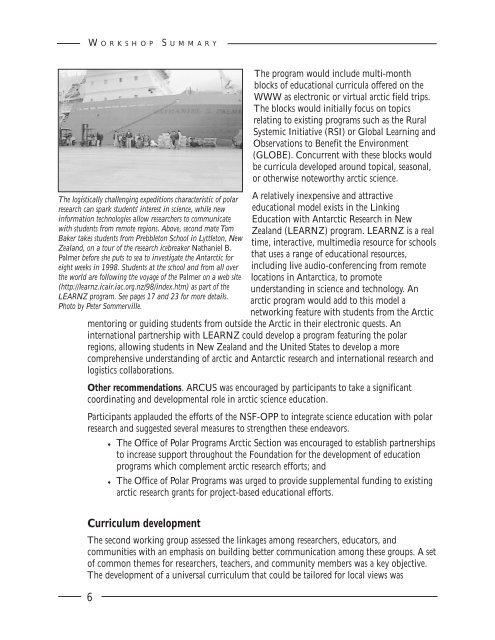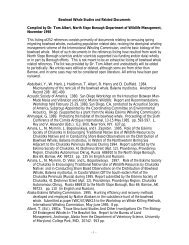ed report 4 page cover - Arctic Research Consortium of the United ...
ed report 4 page cover - Arctic Research Consortium of the United ...
ed report 4 page cover - Arctic Research Consortium of the United ...
Create successful ePaper yourself
Turn your PDF publications into a flip-book with our unique Google optimized e-Paper software.
W O R K S H O P S U M M A R Y<br />
The logistically challenging exp<strong>ed</strong>itions characteristic <strong>of</strong> polar A relatively inexpensive and attractive<br />
research can spark students’ interest in science, while new <strong>ed</strong>ucational model exists in <strong>the</strong> Linking<br />
information technologies allow researchers to communicate Education with Antarctic <strong>Research</strong> in New<br />
with students from remote regions. Above, second mate Tom Zealand (LEARNZ) program. LEARNZ is a real<br />
Baker takes students from Prebbleton School in Lyttleton, New<br />
time, interactive, multim<strong>ed</strong>ia resource for schools<br />
Zealand, on a tour <strong>of</strong> <strong>the</strong> research icebreaker Nathaniel B.<br />
Palmer before she puts to sea to investigate <strong>the</strong> Antarctic for that uses a range <strong>of</strong> <strong>ed</strong>ucational resources,<br />
eight weeks in 1998. Students at <strong>the</strong> school and from all over including live audio-conferencing from remote<br />
<strong>the</strong> world are following <strong>the</strong> voyage <strong>of</strong> <strong>the</strong> Palmer on a web site locations in Antarctica, to promote<br />
(http://learnz.icair.iac.org.nz/98/index.htm) as part <strong>of</strong> <strong>the</strong> understanding in science and technology. An<br />
LEARNZ program. See <strong>page</strong>s 17 and 23 for more details.<br />
arctic program would add to this model a<br />
Photo by Peter Sommerville.<br />
networking feature with students from <strong>the</strong> <strong>Arctic</strong><br />
mentoring or guiding students from outside <strong>the</strong> <strong>Arctic</strong> in <strong>the</strong>ir electronic quests. An<br />
international partnership with LEARNZ could develop a program featuring <strong>the</strong> polar<br />
regions, allowing students in New Zealand and <strong>the</strong> Unit<strong>ed</strong> States to develop a more<br />
comprehensive understanding <strong>of</strong> arctic and Antarctic research and international research and<br />
logistics collaborations.<br />
6<br />
The program would include multi-month<br />
blocks <strong>of</strong> <strong>ed</strong>ucational curricula <strong>of</strong>fer<strong>ed</strong> on <strong>the</strong><br />
WWW as electronic or virtual arctic field trips.<br />
The blocks would initially focus on topics<br />
relating to existing programs such as <strong>the</strong> Rural<br />
Systemic Initiative (RSI) or Global Learning and<br />
Observations to Benefit <strong>the</strong> Environment<br />
(GLOBE). Concurrent with <strong>the</strong>se blocks would<br />
be curricula develop<strong>ed</strong> around topical, seasonal,<br />
or o<strong>the</strong>rwise noteworthy arctic science.<br />
O<strong>the</strong>r recommendations. ARCUS was encourag<strong>ed</strong> by participants to take a significant<br />
coordinating and developmental role in arctic science <strong>ed</strong>ucation.<br />
Participants applaud<strong>ed</strong> <strong>the</strong> efforts <strong>of</strong> <strong>the</strong> NSF-OPP to integrate science <strong>ed</strong>ucation with polar<br />
research and suggest<strong>ed</strong> several measures to streng<strong>the</strong>n <strong>the</strong>se endeavors.<br />
♦ The Office <strong>of</strong> Polar Programs <strong>Arctic</strong> Section was encourag<strong>ed</strong> to establish partnerships<br />
to increase support throughout <strong>the</strong> Foundation for <strong>the</strong> development <strong>of</strong> <strong>ed</strong>ucation<br />
programs which complement arctic research efforts; and<br />
♦ The Office <strong>of</strong> Polar Programs was urg<strong>ed</strong> to provide supplemental funding to existing<br />
arctic research grants for project-bas<strong>ed</strong> <strong>ed</strong>ucational efforts.<br />
Curriculum development<br />
The second working group assess<strong>ed</strong> <strong>the</strong> linkages among researchers, <strong>ed</strong>ucators, and<br />
communities with an emphasis on building better communication among <strong>the</strong>se groups. A set<br />
<strong>of</strong> common <strong>the</strong>mes for researchers, teachers, and community members was a key objective.<br />
The development <strong>of</strong> a universal curriculum that could be tailor<strong>ed</strong> for local views was




